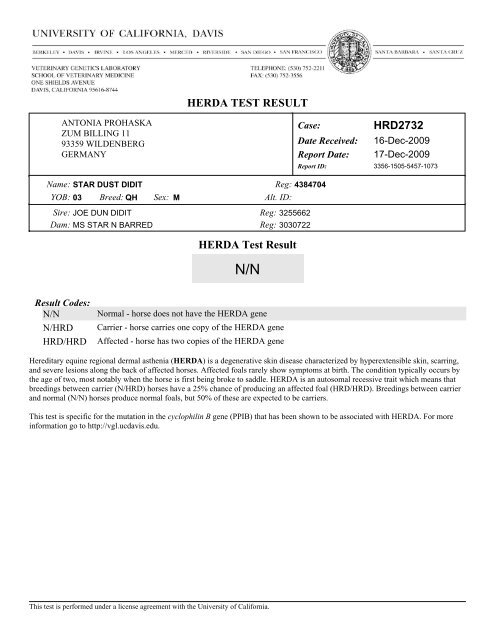HERDA TEST RESULT HRD2732 HERDA Test Result - Heaven 11
HERDA TEST RESULT HRD2732 HERDA Test Result - Heaven 11
HERDA TEST RESULT HRD2732 HERDA Test Result - Heaven 11
You also want an ePaper? Increase the reach of your titles
YUMPU automatically turns print PDFs into web optimized ePapers that Google loves.
ANTONIA PROHASKA<br />
ZUM BILLING <strong>11</strong><br />
93359 WILDENBERG<br />
GERMANY<br />
Name: STAR DUST DIDIT<br />
YOB: 03 Breed: QH Sex: M<br />
Sire:<br />
Dam:<br />
JOE DUN DIDIT<br />
MS STAR N BARRED<br />
<strong>HERDA</strong> <strong>TEST</strong> <strong>RESULT</strong><br />
N/N<br />
Reg:<br />
Reg:<br />
Case: <strong>HRD2732</strong><br />
Date Received: 16-Dec-2009<br />
Report Date: 17-Dec-2009<br />
Reg: 4384704<br />
Alt. ID:<br />
<strong>Result</strong> Codes:<br />
N/N Normal - horse does not have the <strong>HERDA</strong> gene<br />
N/HRD Carrier - horse carries one copy of the <strong>HERDA</strong> gene<br />
HRD/HRD Affected - horse has two copies of the <strong>HERDA</strong> gene<br />
3255662<br />
3030722<br />
<strong>HERDA</strong> <strong>Test</strong> <strong>Result</strong><br />
Report ID: 3356-1505-5457-1073<br />
Hereditary equine regional dermal asthenia (<strong>HERDA</strong>) is a degenerative skin disease characterized by hyperextensible skin, scarring,<br />
and severe lesions along the back of affected horses. Affected foals rarely show symptoms at birth. The condition typically occurs by<br />
the age of two, most notably when the horse is first being broke to saddle. <strong>HERDA</strong> is an autosomal recessive trait which means that<br />
breedings between carrier (N/HRD) horses have a 25% chance of producing an affected foal (HRD/HRD). Breedings between carrier<br />
and normal (N/N) horses produce normal foals, but 50% of these are expected to be carriers.<br />
This test is specific for the mutation in the cyclophilin B gene (PPIB) that has been shown to be associated with <strong>HERDA</strong>. For more<br />
information go to http://vgl.ucdavis.edu.<br />
This test is performed under a license agreement with the University of California.
ANTONIA PROHASKA<br />
ZUM BILLING <strong>11</strong><br />
93359 WILDENBERG<br />
GERMANY<br />
Horse: STAR DUST DIDIT<br />
YOB: 03 Breed: QH Sex: M<br />
Sire:<br />
Dam:<br />
<strong>Result</strong> Codes:<br />
G/G<br />
N/G<br />
JOE DUN DIDIT<br />
MS STAR N BARRED<br />
GBED REPORT<br />
Reg:<br />
Reg:<br />
Case: GBE6<strong>11</strong><br />
Date Received: 16-Dec-2009<br />
Report Date: 04-Jan-2010<br />
Reg: 4384704<br />
Alt. ID:<br />
GBED <strong>Test</strong> <strong>Result</strong><br />
N/N<br />
3255662<br />
3030722<br />
Affected - Homozygous for GBED (two copies of the GBED gene).<br />
Carrier - Heterozygous (one normal and one GBED gene).<br />
N/N Normal - Does not possess the disease-causing GBED gene.<br />
Report ID: 0987-1739-6758-4142<br />
The condition is inherited as a recessive trait. This means that breedings between two carrier (N/G) horses have a 25% chance of<br />
producing an affected foal (G/G). Affected foals usually die at a young age or will need to be euthanized due to weakness. Breedings<br />
between carrier and normal (N/N) horses produce only normal foals but 50% of these are expected to be carriers.<br />
This test is performed under a license agreement with the University of Minnesota.
Tierärztliche Klinik<br />
Dres. S. / W. & J.-A. Ranner / Ranner / SichertOKLIN GmbH<br />
Obere Au 5 Steubenstr. 4<br />
84069 Schierling 97668 Bad Kissingen<br />
Deutschland Tel-Nr.: 0971-72020<br />
Eingangsdatum: 30-04-20<strong>11</strong><br />
Angaben zum Patienten: Pferd Quarter Horse "Star Dust Did It"<br />
weiblich * 17.03.03<br />
Probenentnahme: 28-04-20<strong>11</strong><br />
Patientenbesitzer: Prohaska, Antonia<br />
Probenmaterial: Haare<br />
Befund-Nummer: <strong>11</strong>04-S-30251<br />
Messgrößen Ist Normalwert<br />
Polysaccharid Storage Myopathy (PSSM) - PCR<br />
PSSM:<br />
Ergebnis: Genotyp: N/N<br />
Interpretation: Das untersuchte Pferd ist reinerbig für das intakte Gen.<br />
Es ist kein Träger des mutierten Gens für die Polysaccharid-Speicher- Myopathie<br />
Typ1. Das Tier wird die von der Mutation ausgelösten Symptome nicht ausprägen.<br />
An die Nachkommen wird nur das intakte Gen weiter- gegeben. Das Ergebnis gilt<br />
nur für das im Labor eingegangene Untersuchungsmaterial.<br />
Lebensnummer: 4384704<br />
Chip-Nummer: ---<br />
Täto-Nummer: ---<br />
Das Labor ist für die oben stehende/n Untersuchung/en akkreditiert nach DIN EN<br />
ISO 17025 (AKS-PL-20922). Die Verantwortung für die Richtigkeit der Angaben zu<br />
den eingesandten Proben liegt beim Einsender. Gewährleistungsverpflichtungen<br />
können nicht übernommen werden. Schadensersatzverpflichtungen sind, soweit<br />
gesetzlich zulässig, auf den Rechnungswert der durchgeführten Untersuchung/en<br />
beschränkt.<br />
*** ENDE des Befundes ***<br />
Fr.Dipl.-Biol. Bärbel Gunreben<br />
Abt. Molekularbiologie<br />
- 1 -


